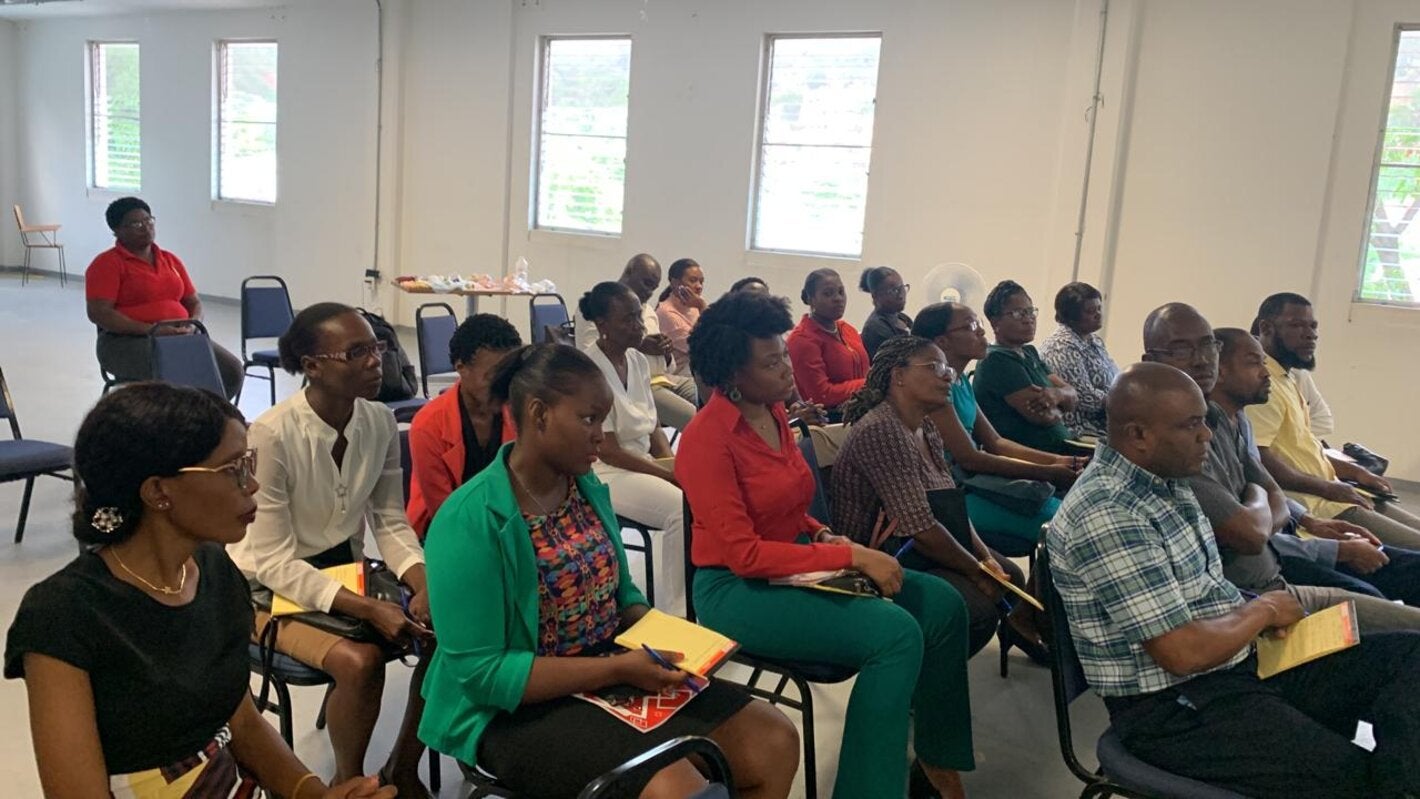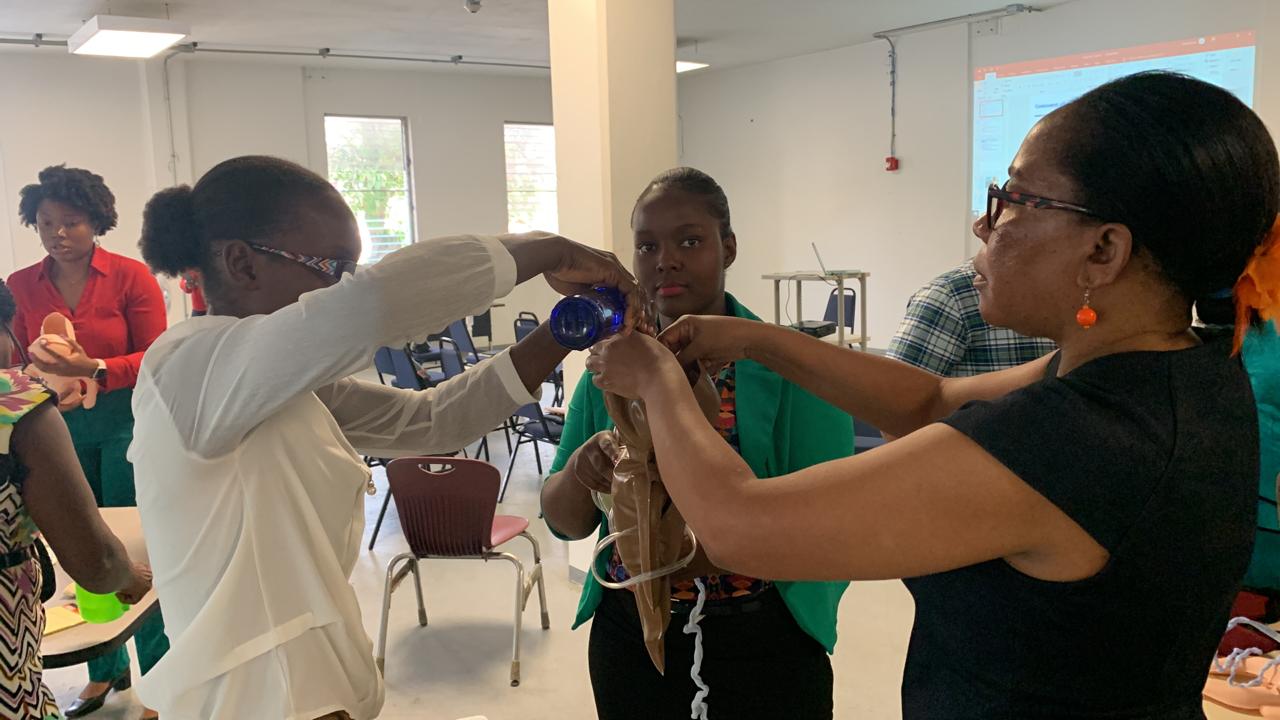
Montevideo, 18 March 2024. Universal access to timely, quality care for newborns is essential for their survival and optimal development. Essential care includes simple, low-cost practices that help prevent preventable newborn deaths. Strengthening the skills of health professionals, especially in regions with high neonatal mortality, is a crucial strategy to save lives.
The Pan American Health Organization (PAHO) is working with Haitian health authorities to improve the quality of care in the country. Through the Latin American Centre for Perinatology - Women's and Reproductive Health (CLP/WR), a workshop was held in November 2023 to strengthen the local capacities of health personnel receiving or caring for newborns. The activity took place at the Justinien University Hospital in Cap-Haïtien with the participation of Dr. Helenlouise Taylor and Dr. Alejandro Dinerstein as instructors.
Both professionals had travelled to the city a few days earlier to get to know the facility, the difficulties it presented, and to work with local representatives on the homogenisation of the materials that would be needed. There, they worked closely with the director of the Ministry of Health, Dr. Marjorie Preval Desmangles; the PAHO consultant in Haiti, Dr. Anthony Monfiston; and the national consultant, Dr. Clertida Lamoth.
A review was made of the typical care process for newborns in Haiti, including preparation for delivery, the immediate care babies receive, and follow-up when they leave the health facility. Additional care that is needed, for example, for premature or low-birth-weight babies, was also discussed.
For Dr. Taylor, it is clear that it is important to start with the basics. "There are practices that are very simple and can be quickly adopted, such as skin-to-skin contact, early breastfeeding and basic care that have very important impacts on newborns and their development".
The issue of hygiene was emphasised. Experts stressed the need for clean delivery rooms, adequate hand washing and sterility of equipment, which was complicated by intermittent access to clean water. In addition, they mentioned the importance of having equipment that is essential for resuscitation (such as bags or masks), and developing evidence-based interventions.
Another challenge pointed out by the experts was the paucity of data on neonatal care, effective coverage of interventions and neonatal outcomes (morbidity and mortality). The most recent data is from 2016 and is very outdated, making it difficult to design and prioritise interventions at the national level.
An innovative approach to training trainers
The training provided is part of a strategy that aims to strengthen local capacities through the training of trainers. This implies that the trainees not only learn or deepen their knowledge, but also have to be able to replicate the content and thus extend the knowledge.
The course had both theoretical and practical components including: lectures, assisted clinical practice, simulations and role-plays, use of videos, case studies, reflection on practice and improvement of quality of care.
In addition, simulators (dolls, kangaroo mother care wraps, among others) were used, which facilitated practice and the incorporation of new techniques.
Dr. Taylor noted that it was a challenge to get some of the participants to take on the role of future trainers. "Learning to teach is difficult, and we had to do a lot of work to build their confidence. It's good that they have the skills to continue leading processes".
Dr. Dinerstein referred to the commitment of those who participated (26 people in total) and highlighted the role of Dr. Preval, from the Ministry of Health, and Dr. Casamayor, from the Haitian Paediatric Society. "The professionals in attendance were challenged to present the modules and took on the role of facilitators, which contributed enormously to the results, as they gained confidence as disseminators of the activity. We, day by day, took on a more accompanying role and reduced our interventions as the participants developed their skills. The progress and confidence in their own activities was very clear throughout the days," he said.
For his part, PAHO's regional advisor on Perinatal Health, Dr. Pablo Durán, who was in charge of coordinating this action, said that "this type of training is part of a strategy that is being used in several countries in the Americas region in order to reduce neonatal mortality, however, it is essential to adapt them to the realities and needs of each country to obtain the results we want. The advisor added that CLP/WR continues to work with the country to advance a roadmap to improve conditions and accelerate the reduction of neonatal mortality.
A personal look at the impact and experience
Both Dr. Taylor and Dr. Dinerstein highlighted PAHO's role in Haiti.
In particular, Dr. Taylor said, "I think the accompaniment provided by PAHO is very important. There is a need for continuous work. I understand that this is a first step and it is very valuable for all that it has generated, but we must continue working to transform these realities that are so unjust and painful" ... "I feel privileged to have been able to be there. For me it was a very enriching process and I would love to continue contributing to it.
Dr Dinerstein said, "The participants of this first course will be able to influence change in their institutions using the skills acquired, the materials provided and the WHO guidelines. They could become the core team of facilitators in a defined geographical area and move to neighbouring health facilities.
He further stressed that "Working in places with realities that are different from what I am used to forces me to abandon pre-established recipes and not try to impose solutions out of context. As a facilitator, accompanying the process and the different learning strategies, understanding that one learns with and from peers and that the process is as important as the content is fundamental".
Finally, he said that the experience allowed him to reaffirm the virtues of essential newborn care and, in particular, the importance of respectful treatment and family-centred care from a rights-based perspective.




